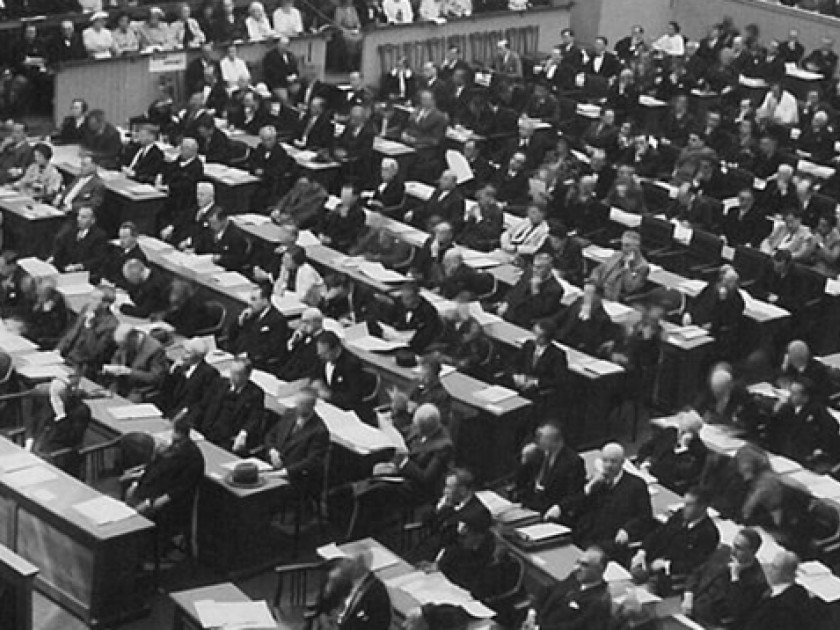Join a community of readers who are committed to Jewish stories
Sign up for JBC’s Nu Reads, a curated selection of Jewish books delivered straight to your door!

Header photo credited to the World Jewish Congress.
Menachem Z. Rosensaft, editor of The World Jewish Congress, 1936 – 2016, will be guest blogging for the Jewish Book Council this week as part of the Visiting Scribes series.
In order to place the different essays that make up The World Jewish Congress, 1936 – 2016 in their historical context, it is important to understand the origins of the organization.
While the WJC formally came into being at its first plenary assembly in Geneva in August 1936, its roots actually lie in an ad hoc body called the Comité des Délégations Juives Auprès de la Conférence de la Paix – the Committee of Jewish Delegations at the Peace Conference – that was formed in 1919 to advocate at the Versailles Peace Conference for minority rights – that is, primarily, Jewish rights – in eastern and central European countries in the aftermath of World War I.
The Comité des Délégations Juives was an anomaly at the time in that it included representatives from Jewish groups in Canada, Eastern Galicia, Poland, Romania, Russia, and Ukraine, in addition to B’nai Brith and American Jewish organizations such as the newly founded American Jewish Congress and the 13-year old American Jewish Committee.
This was literally the first time that such an umbrella body representing at least a meaningful segment of world Jewry had come into existence.
The participation of the American Jewish Committee in the Comité des Délégations Juives was particularly noteworthy since it was otherwise categorically against any association with other Jewish groups in any endeavor that could be interpreted as an international Jewish politically oriented initiative, as opposed to one that was strictly American and philanthropic in nature.
Following the end of the Peace Conference, the Comité des Délégations Juives remained in existence under the leadership of a prominent Paris-based Russian Zionist named Leo Motzkin, and continued to make representations on behalf of Eastern European Jews before the League of Nations and other international bodies.
At the same time, throughout the 1920’s and early 1930’s, Rabbi Stephen S. Wise, one of the founders of the American Jewish Congress, called for the establishment of a world Jewish Congress – over the fierce objections of the American Jewish establishment, in particular the American Jewish Committee.
In August of 1927, 60 delegates from the US, 12 other countries, and Mandatory Palestine gathered in Zurich for what was billed as the World’s Conference on Jewish Rights. Again, the purpose of this conference was to find some means of coordinating efforts to help Jewish minorities in central and eastern European countries where they were being discriminated against if not actively persecuted.
Wise continued his quest for a world Jewish congress over the next several years, as Hitler’s Nazi Party was becoming increasingly powerful in Germany.
In August of 1932, the first of three World Jewish Conferences took place in Geneva, this time with 94 delegates from 17 countries, but without the participation of the American Jewish Committee, the Board of Deputies of British Jews, or the Hilfsverein der deutschen Juden, the umbrella body of Germany’s Jewish community. By then, Wise had enlisted a young Russian-born German Zionist leader, Dr. Nahum Goldmann, to organize the event. It was the beginning of a friendship and political association between the two that would last until Wise’s death in 1949.
Two more such world conferences followed, both taking place in Geneva after Hitler’s rise to power.
By the third World Conference in 1934, Wise and Goldmann were planning the formation of a World Jewish Congress, modeled on the American Jewish Congress, as a mechanism to counter Nazi anti-Semitism, and in August of 1936, the WJC formally came into being as an organization.
This was the first time that Jewish leaders from different countries joined together as a decidedly political, rather than philanthropic, body, for the express purpose of representing Jews around the world. And over the following several years, the fledgling organization rapidly became the most outspoken defender of Jewish rights, both publicly and in behind-the-scenes diplomatic negotiations.